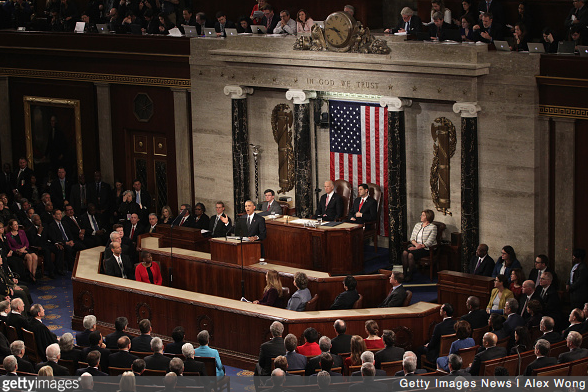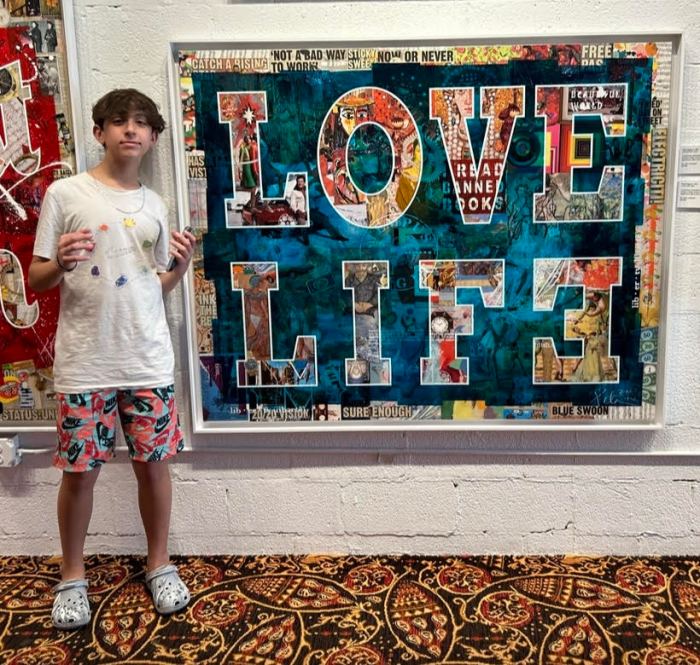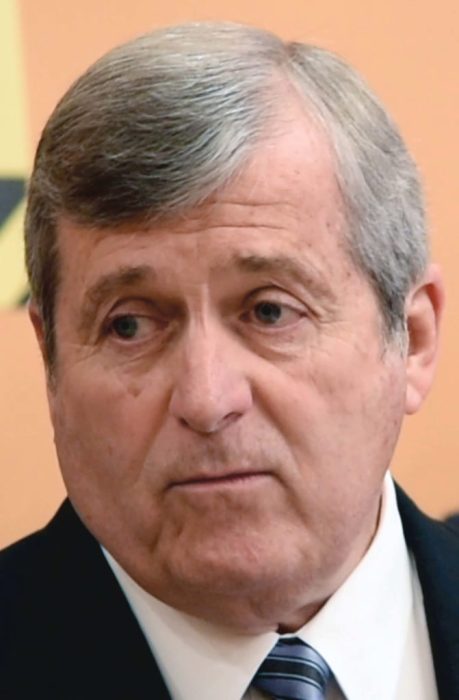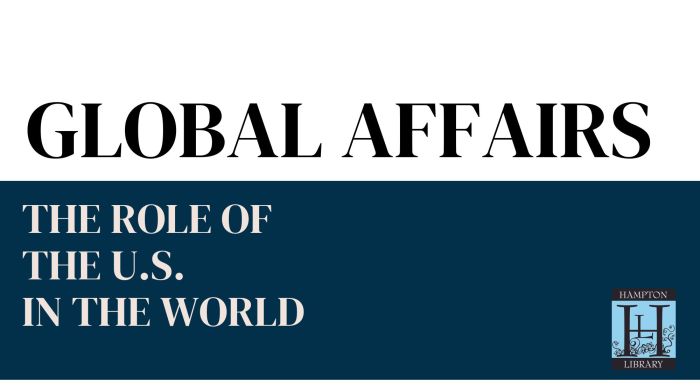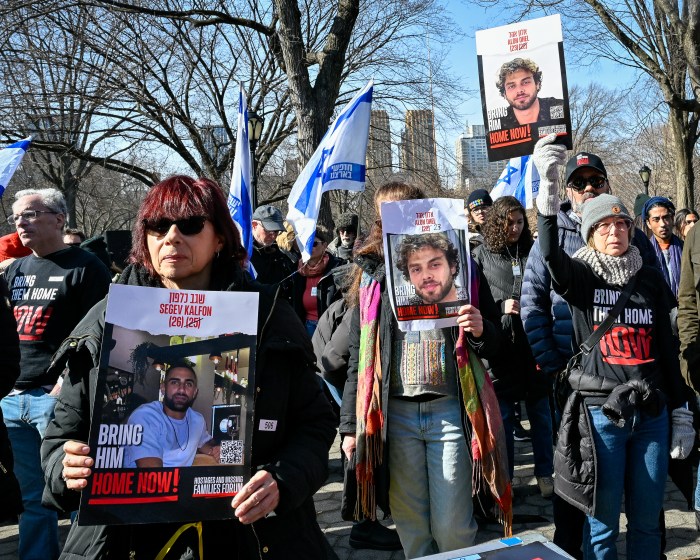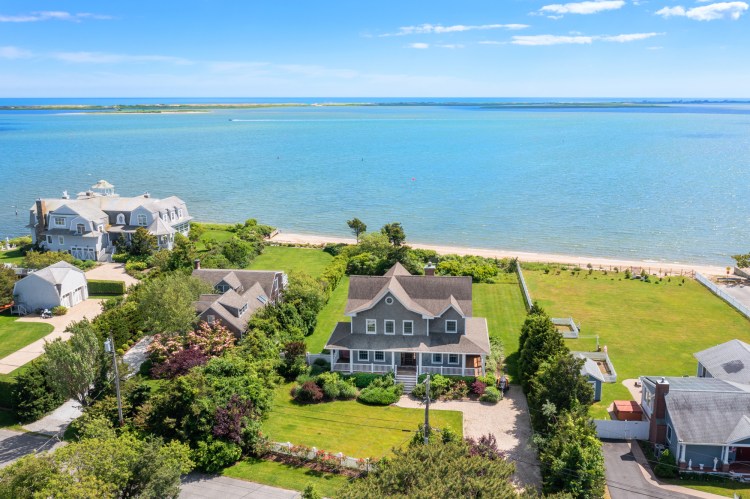As Obama made his way to the podium, he was trailed by the Senate Majority Leader, Kentucky’s reactionary Republican Sen. Mitch McConnell, wearing an ugly green tie, and looking like a turtle out of his shell. McConnell’s stubborn vow in early January 2009 to not let the president-elect “succeed in anything” should follow him to his grave.
Obama was in a good mood, shaking hands, reaching out, touching supporters, kissing cheeks, and giving Supreme Court Justice Ruth Bader Ginsberg a big hug—reminding us that if only we had more liberal jurists like her on the Court, we wouldn’t have Chief Justice Roberts poised to roll back the power of public unions—another item on the conservative billionaires’ agenda.
When the president said “there is red tape to be cut,” that was red meat to the Republican side of the aisle. Not what came next. “But after years of record corporate profits,” Obama continued, “working families won’t get more opportunity or bigger paychecks just by letting big banks or big oil or hedge funds make their own rules at everybody else’s expense.”
When he mentioned making Wall Street pay more instead of trimming food stamps to balance the budget, the reaction got partisan. “Immigrants aren’t the principal reason wages haven’t gone up,” Obama told the country. “Those decisions are made in boardrooms that all too often put quarterly earnings over long-term returns. It’s sure not the average family watching tonight that avoids paying taxes through offshore accounts.” Touche!
Then he doubled down on another issue that’s roiling the Republican electorate. “Sixty years ago, when the Russians beat us into space, we didn’t deny Sputnik was up there!” he said, drawing laughter in the House chamber. “We didn’t argue about the science, or shrink our research and development budget. We built a space program almost overnight, and twelve years later, we were walking on the moon.”
As he tackled climate change, the lack of Republicans applauding was painfully obvious even while he tried to appeal to their enlightened self-interest. “But even if—even if the planet wasn’t at stake, even if 2014 wasn’t the warmest year on record until 2015 turned out even hotter—why would we want to pass up the chance for American businesses to produce and sell the energy of the future?”
Emphatically Obama said that the United States was “the most powerful nation on Earth, period,” and the camera pointed to the Joint Chiefs of Staff seated in the front row. They resembled a gang of thugs or a grizzled old rugby team. Either way, you don’t want to mess with those guys. They didn’t break a smile.
Then Obama took on the issue driving the Republican presidential nominees: al Qaeda and ISIL (aka ISIS). Against the threat, he defended his use of American power, and called on Congress to approve the unauthorized war against ISIS. “Over-the-top claims that this is World War III just play into their hands,” he said.
He cited what happened in Vietnam and Iraq, and said, wisely, that we should learn from our mistakes. In fact, if President George W. Bush hadn’t let his quasi-Prime Minister Dick Cheney pull a bait and switch by leaving Afghanistan prematurely to take out Saddam Hussein, it’s doubtful that ISIS would have risen in the Mideast region that his administration destabilized. On Tuesday night, Obama didn’t say, “Told you so!,” although he could have, considering he voted against the Iraq invasion, unlike his 2008 Democratic rival, Hillary Clinton. Instead, Obama said that “masses of fighter on the back of pickup trucks, twisted souls plotting in apartments or garages” are not a threat to our national existence. Apparently Obama’s observation lit up the right-wing twitter-sphere, drawing condemnation from the fear-mongering GOP candidates and their bellicose conservative pundits.
Obama turned up the heat when he subtly referred to Sen. Ted Cruz’s plan to carpet-bomb the ISIS state and somehow spare the innocent civilians they’re holding hostage. Because Cruz was on the campaign trail, the camera cut to Cruz’s rival who had actually showed up, Sen. Marco Rubio—a wise move on the Florida Senator’s part since his record of absenteeism has become an issue used against him—but Rubio looked like an impatient high school kid waiting for class to end so he could dash off to recess.
With tight-lipped Vice President Joe Biden seated behind him on one side and smirking House Speaker Paul Ryan on the other, Obama was clearly enjoying himself. In a nice moment, full of portent given the tragic death of Biden’s son Beau, the president made Biden his cancer czar. Biden beamed with gratitude.
Then Obama took on the divisive rhetoric of Donald Trump, without mentioning him by name. He started by pointing out that right at the same spot where he was giving his State of the Union address, the Pope had delivered a speech extolling the virtues of tolerance over the tyranny of hate. Obama expanded on that theme.
“When politicians insult Muslims, whether abroad or fellow citizens, when a mosque is vandalized, or a kid is called names, that doesn’t make us safer,” the president said. “It diminishes us in the eyes of the world.” He reminded the country that “We the People” are the first three words of our Constitution, and that means everybody.
From there his speech took a poignant, lofty turn as he called upon the better angels of our nature to fix our politics, to free us from the rancor that has trapped too many people, and how wrong it is to assert that our political opponents are unpatriotic just because they take a different point of view. He regretted that he didn’t have the eloquence of Lincoln or Roosevelt to bridge the gap, and that the country is more divided now than when he tried to sow the seeds of hope and change.
He urged politicians to tune out the noise of their base and listen to the voice of the people. He reminded them of their duties as citizens to defend the weak. Then, rising to the occasion, he wanted to end on an optimistic note. He pointed out the global appeal of America’s brand of diversity, and how that mix of religions and races has made us strong. And if we embrace those values, our best days will still lie ahead, he insisted.
It may have been his best State of the Union speech, reminding us what he’s accomplished despite hostile opposition that bordered on racism. It got us feeling nostalgic, remembering how he’d stood tall in 2009 when the economy was sliding into the abyss of the Great Recession and Congressional Republicans had gone AWOL. With only Democrats on Capitol Hill lined up behind him, Obama used his presidential power to pass the stimulus package and get the country on the right track back. No, it didn’t go nearly far enough but it was better than doing nothing. For their efforts, many of those Democrats were defeated at the polls as the Tea Party surged two years later.
But look at the country now. Even a conservative columnist like David Brooks has had to admit this: “…America is in better economic shape than any other major nation on Earth. Crime is down. Abortion rates are down. Fourteen million new jobs have been created in five years.”
Let’s not forget that millions of Americans also have health insurance for the first time and marriage equality is the law of the land. That’s truly a tribute to Obama’s leadership.
But there’s a limit to Obama’s lofty oratorical skills. Words alone won’t redress the oligarchs’ concentration of wealth. So it was interesting to see Sen. Bernie Sanders (I-Vermont), whose campaign for the Democratic presidential nomination is predicated on doing something about it, come on camera, however briefly, during the night’s proceedings. He looked like an eccentric Ivy League professor, especially when he pulled a notepad out of his inside jacket pocket. Currently, the Vermonter is leading Hillary Clinton in Iowa’s upcoming caucus and the New Hampshire primary. If those results hold, it could be a very close race between them to succeed Obama and build upon his legacy.
For the Republican rebuttal, the Grand Old Party turned to its third woman in four years, giving the spotlight to South Carolina Gov. Nikki Haley, the daughter of Indian immigrants with a compelling personal narrative that led her to the governor’s mansion in Columbia. As she spoke, it was hard to ignore her blinding white teeth, a shining dental achievement in themselves. But the words she uttered were quite unusual for someone in her role. Of course, she obliged her party by blaming Obama for not accomplishing anything but falling short on the economy, tax reform, urban unrest and the national debt.
But then Haley told her party’s supporters, “We need to be honest with each other and with ourselves: while Democrats in Washington bear much responsibility for the problems facing America today, they do not bear it alone. There is more than enough blame to go around. We as Republicans need to own that truth.”
She didn’t stop there, she went significantly further. “During anxious times, it can be tempting to follow the siren call of the angriest voices,” the governor said. “We must resist that temptation.” Then Haley issued a clarion call to tone down the extremist rhetoric.
Movingly, the governor recounted the mass shooting last June at the Mother Emanuel church in Charleston, sparked by an angry white man—Haley actually called him “a domestic terrorist”—who had turned his gun on a Bible study meeting and killed nine black parishioners, according to authorities. Gov. Haley praised how her state responded to this hate crime: “We didn’t have violence, we had vigils. We didn’t have riots, we had hugs.”
Just as important she authorized that South Carolina remove “a symbol that was being used to divide us.” And so the Confederate flag no longer waves over the capitol, something that some of us with long memories of the civil rights struggle in the South thought we’d never see. Definitely a positive sign.
So, as pundits parsed the State of the Union speech and the rebuttal, some themes have emerged that will play out the rest of this important, bitterly contentious campaign season: Will 2016 be a year for our best hopes or our worst fears? How the voters answer will determine the future of our country for a long time to come. Let’s hope they heed the president’s call to do their civic duty.



